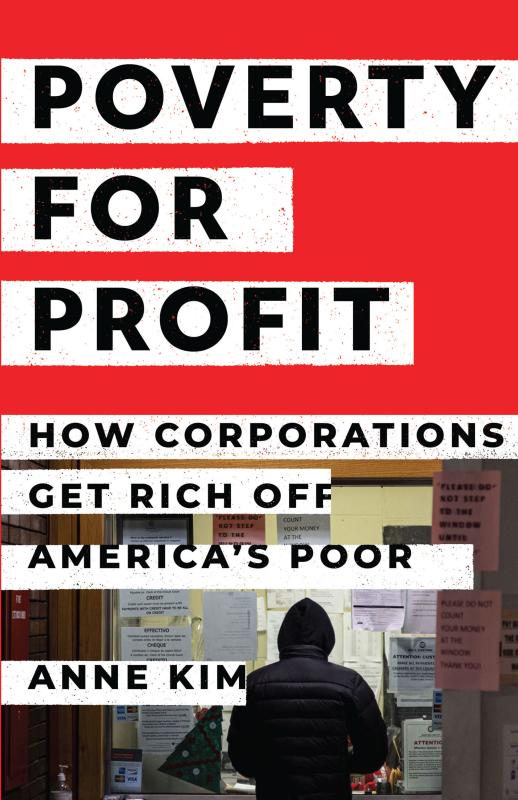By Anne Kim, author of Poverty for Profit: How Corporations Get Off America's Poor
Jackson Hewitt is one of America’s largest tax preparation chains, with nearly six thousand outlets nationwide. A fixture in urban strip malls and inside Walmart stores, the company targets low-income taxpayers, including those eligible for the federal Earned Income Tax Credit (EITC). Forty-three percent of clients claim the credit, according to the company’s website, and nearly 80 percent earn less than $55,000 a year. Almost all clients expect a refund, so the company offers “refund advance” loans for those who want their money right away (including, in part, to finance tax prep fees).
The company does not, however, reveal its fee structure, profits, or the share of revenues derived from programs like the EITC. Though once a publicly traded company, Jackson Hewitt’s current owner is New York–based private equity firm
Corsair Capital, which bought it in
2018 for an undisclosed sum. As a “portfolio” company of Corsair, Jackson Hewitt is no longer obligated under federal securities laws to disclose its finances. The same opacity cloaks Jackson Hewitt’s competitor, Liberty Tax, which was also once public but now
privately owned.
This lack of transparency should alarm both taxpayers and the public, especially given the EITC’s cost—about
$57 billion in 2022. The EITC is among the federal government’s largest antipoverty programs, but firms like Jackson Hewitt and Liberty Tax diminish its effectiveness by skimming often substantial fees. But exactly to what extent is a mystery, shrouded by private equity’s trademark secrecy.
Over the past several decades, important segments of the economy have slipped into the shadows of private equity. Public companies accounted for just
13 percent of North American company revenues in 2022, according to private equity behemoth KKR, while their number has declined by nearly half since 1996.
But many newly private concerns—like tax preparation and health care—depend on public dollars. Nursing homes, for example, have been a
popular target for private equity buyouts in recent years and typically derive about
75 percent of their revenues from Medicare and Medicaid. Private equity–owned “dental service organizations” now manage many
dental clinics reliant on Medicaid. According to Lehigh University professor Laura Katz Olson, private equity has bought out vast networks of clinics in dermatology, ophthalmology, orthopedics, gastroenterology, home health care and hospice, in addition to other specialties. Yet the scale and impact of these acquisitions are unknown. “Private equity lives in a darkly curtained world, protected from external scrutiny,” as Olson writes in a 2022
book on the topic.
New federal securities laws should pierce this veil of secrecy, particularly for companies that deliver social services and rely on government programs for revenues. Congress should amend the Securities Exchange Act of 1934 to treat these firms as “public”—even if privately held—and require them to file annual and quarterly reports with the Securities Exchange Commission (SEC). Taxpayers are, in effect, investors in these de facto public concerns and entitled to know where their money is going.
Under current law, companies with publicly traded stock must regularly disclose “
material” information about themselves on pain of
civil and
criminal penalties. The SEC’s
Regulation S-K, for example, dictates the contents of annual reports, including revenues and liabilities, business strategy, pending litigation, and executive compensation, among other critical details. Though the principal intent of federal securities laws is
investor protection, mandatory disclosure also benefits the public. As Georgetown University law professor Donald C. Langevoort wrote in a seminal
2013 article, “Disclosure is a public good.”
When Jackson Hewitt was still public, for instance, it revealed a wealth of information about its practices that proved useful to policymakers. Its first annual
report in 2005, for example, disclosed that more than a quarter of its $232.5 million in revenues that year—or about $70 million—came from “refund anticipation loans” and other high-cost financial products. It conceded that these products’ effective interest rates were “relatively high compared to other consumer loans” and warned that regulation would “reduce our profitability.” Consumer advocates
mined the company’s public documents to bolster their case for regulation, and at least
eighteen states passed legislation limiting refund anticipation loans.
Mandatory disclosure would likewise reveal private equity’s internal workings, potentially leading to public and investor pressure for better corporate behavior. Increasingly clear is that private equity’s current lack of scrutiny is bad for the public interest. Research finds, for instance, that private equity ownership of hospitals, nursing homes, dentistry, and other sectors can lead to
higher prices,
poor quality patient care, questionable business practices, and even fraud. In a 2022 investigation, KFF Health News calculated that health care companies managed or owned by private equity have coughed up more than
$500 million in fines since 2014 to settle lawsuits for fraud and overbilling brought under the federal False Claims Act.
The private equity–owned Kool Smiles dental chain, for instance, paid
$24 million in 2018 to settle federal claims of “medically unnecessary” treatments, including root canals performed on toddlers. In another suit reported by KFF, a whistleblower accused the private equity–run National Spine and Pain Centers of billing Medicare up to $1,800 apiece for “unnecessary and often worthless” urine tests. The whistleblower further cited the company’s “revenue maximization” policies, which required providers to see at least twenty-five patients a day.
Taxpayers should not have to rely on whistleblowers to learn how their dollars are spent. Yet the SEC does not currently have statutory authority to require disclosure from private equity portfolio companies. Broadly speaking, federal securities laws define a company’s “publicness” by its number of shareholders, not its “
larger societal footprint,” as some legal experts argue should be the case.
Ideally, Congress should redefine what it means to be “public” in an era of private equity domination. In the meantime, Congress should at least require public companies acquired by private equity to stay “public” for reporting purposes if, for example, more than a quarter of its revenues come from public programs like Medicare, Medicaid, or the EITC, or from government contracts. This move would not reach every transaction, but it could staunch companies’ slide into secrecy. It could also complement state efforts to regulate private equity, as California is currently contemplating. Most importantly, it would help expose the strategies fueling private equity’s profits—and at what price to the public interest.
Private equity might see itself as answerable only to its investors. But when public money is in private hands, American taxpayers have the right to demand accountability too.
Anne Kim is the author of Poverty for Profit: How Corporations Get Rich Off America’s Poor (The New Press, 2024). She’s also a former securities lawyer who practiced at major law firms in New York and Washington, DC.
Sources:
1. In 2021, Liberty Tax was bought by NextPoint Financial, a “special purpose acquisition company” that later went bankrupt.
2. Ibid, page 25.
3. Ibid, page 15.
4. See page 8 of the hyperlinked document, citing the Jackson Hewitt 10-K, plus public filings of other companies.
5. (Kool Smiles, a brand of the dental management company Benevis, is owned by Foundation Dental Partners, which is in turn owned by the private equity firm Keystone Capital, Inc.)
6. (National Spine has changed hands at least twice in the past seven years; former owners include Sentinel Capital Partners and Avista Healthcare Partners.)


